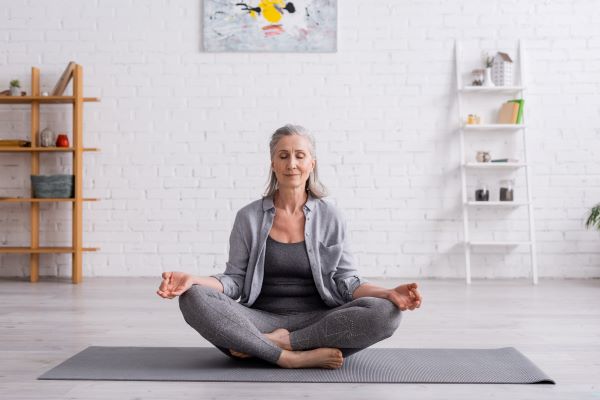
In an Age of COVID, Meditation Has Many Benefits
Around the world, COVID-19 continues to be a traumatic event. Previously unthinkable challenges, unwanted changes, and devastating losses of loved ones became all too common. Whether you call it meditation, yoga, prayer, spirituality, contemplative or philosophical thought, meditative practices can support patients, healthcare professionals, caregivers, and the general public. While the healthful benefits of meditative practices are not new, it has never been more important to adopt as a lifestyle choice.
Mindfulness-Based Stress Reduction Techniques for COVID-19
These many forms of mindfulness-based stress reduction techniques improve measures of pain, depression, and anxiety scores. Incorporating meditative practices into your life can help quiet your mind, calm your soul, and brighten your outlook on life after the devastating crisis of the COVID-19 pandemic and hopefully a soon post-crisis COVID-19 America.
Long-term and consistent meditation practices bring about positive structural and functional brain changes, and these practices translate well across the lifespan and range of abilities of different populations. Meditation techniques are simple and low-cost, providing benefits for whoever opts to become a practitioner.
As the terms meditation and mindfulness prominently reassert themselves into mainstream culture during this stressful time, it is important to identify the differences in the terms. Meditation general refers to a formal practice calming the mind and enhancing our self-awareness. The benefits of meditation are increasingly useful as a therapeutic modality. Therapeutic modalities represent administering thermal, mechanical, electromagnetic, and light energies to produce a specific therapeutic effect, including; decreasing pain, increasing range of motion, and improving muscle activation or tissue healing.
What is Mindfulness?
Mindfulness is more of an umbrella term under which meditation falls. Mindfulness is simply being aware of the present moment and as much as that may encompass. Meditation practices may include mindfulness of breathing and compassion-focus via phrases or mantras, among other techniques. By using mindfulness within meditation, present moments permit individuals to observe what is arising and what is falling away as time passes. It can teach us the value of letting go, which is key to reducing anxiety and stress.
Negative patterns of repetitive thoughts, mind flurry or chatter, and list, craving, or fear spirals can gently fall away without judgment when using the anchor of mindful breathing and body scan to release areas that hold tension and stress. Some meditation practitioners may find phrases and mantras to help guide and focus their attention on the present moment. The practice of walking meditation creates an entire focus of awareness on the feet being in contact with the earth for grounding properties. Trying new meditation techniques enhances the breadth of mindfulness in life and promotes general wellness.
Research shows that long-term, consistent meditative practices modify our brains’ plasticity for the better, changing the brain areas concerned with stress and anxiety and promoting inflammation regulation. The amygdala will begin to show a decrease in activity consistent with an improvement in emotional regulation. The prefrontal cortex, cingulate cortex, and hippocampus all show an increase inactivity.
Autonomous sensory meridian response (ASMR) is a form of meditation that can lower a viewer’s heart rate and has become very popular among younger internet users. The average age of ASMR consumers ranges from eighteen to twenty-five years old. This demographic is unsurprising as the COVID-19 pandemic negatively affects the brain development of young Americans (the brain will fully develop at about the age of thirty). ASMR provides a familiar experience (the internet) with non-self-directed relaxation techniques. Older Americans who may struggle to succeed using more traditional meditative practices might begin with ASMR videos to help facilitate their progress.
For most people, the challenges of COVID-19 are lasting and profound. Incorporating meditative practices into your life can help you overcome confusion, fear, and anxiety while promoting better physical health. No matter your age, structuring a worldview with a perception of calm and stability is good for your health and interactions with those around you. If you have questions or would like to discuss your planning needs please contact us at (270) 483-3001.
